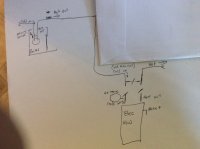Kenny Diehl
New Member
need some advice. My house has a Burnham Hydronic heating system with a tankless coil for domestic HW. The boiler is located at the opposite side of the house as most ofmthe Domestic demand(kitchen,2 baths). Tankless coils IMHO are ineffeciant to begin with but in my case I can barely get hot water to the other side of the house. Ok, to put a separate HW heater in a more central location limits me to Indirect or Electric because of flue venting restrictions. I decided to go electric since the house has solar electricty. My question is I want to cut the electric HW in after the tankless coil but before any of the fixtures .
My reason would be in case of a power failure I would still have the hot water from the furnace. I can run the furnace off a smaller genset. I want to put an “H” style bypass above the electric HW so in a no power scenario, I can just close two valve and open the bypass to eleminate the elec HW otherwise I would have to push 50 gals of cold water out first. Now of course this create a possible safety concern. If someone bypasses the Elec and forgets to shut it off, it could come on when power is restored and build up excessive pressure. They have a relief on the side but as an added level of safety and protection, I was thinking install and expantion tank between the cold water inlet on the electric and the cold water shut off. I’ll attach a very poor drawing(sorry my art skills are not good). Opinions ?
My reason would be in case of a power failure I would still have the hot water from the furnace. I can run the furnace off a smaller genset. I want to put an “H” style bypass above the electric HW so in a no power scenario, I can just close two valve and open the bypass to eleminate the elec HW otherwise I would have to push 50 gals of cold water out first. Now of course this create a possible safety concern. If someone bypasses the Elec and forgets to shut it off, it could come on when power is restored and build up excessive pressure. They have a relief on the side but as an added level of safety and protection, I was thinking install and expantion tank between the cold water inlet on the electric and the cold water shut off. I’ll attach a very poor drawing(sorry my art skills are not good). Opinions ?

